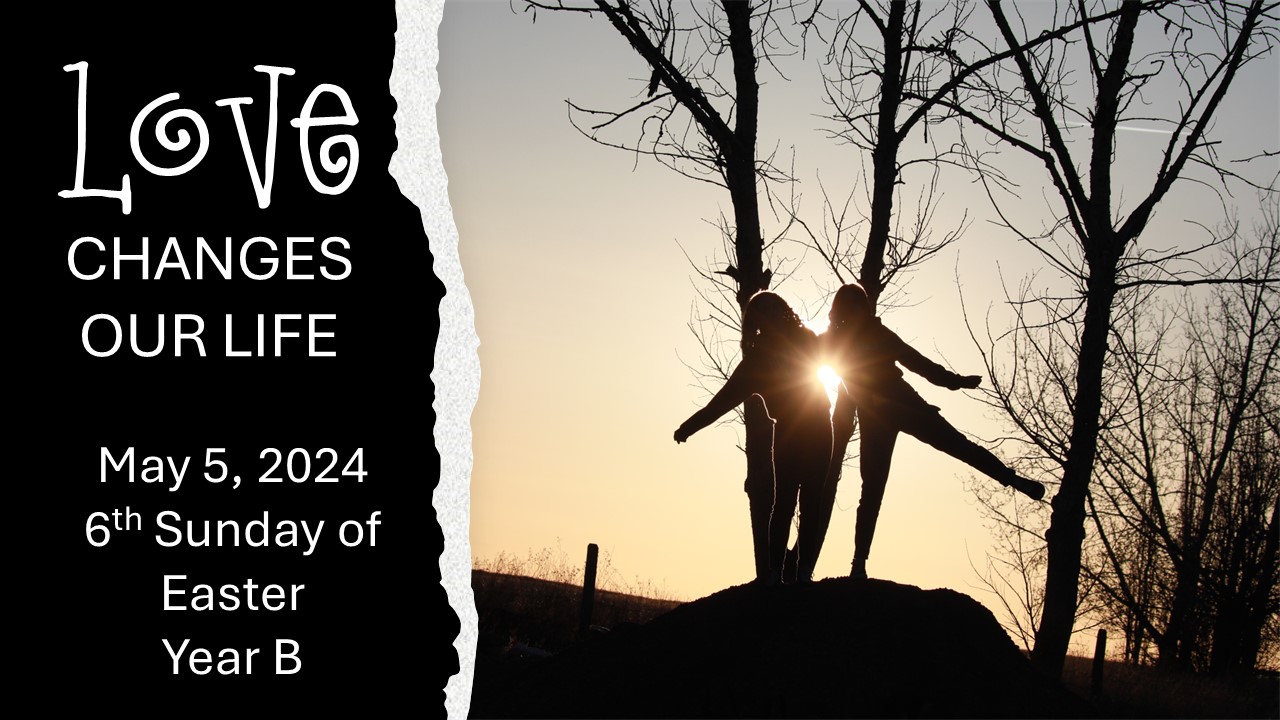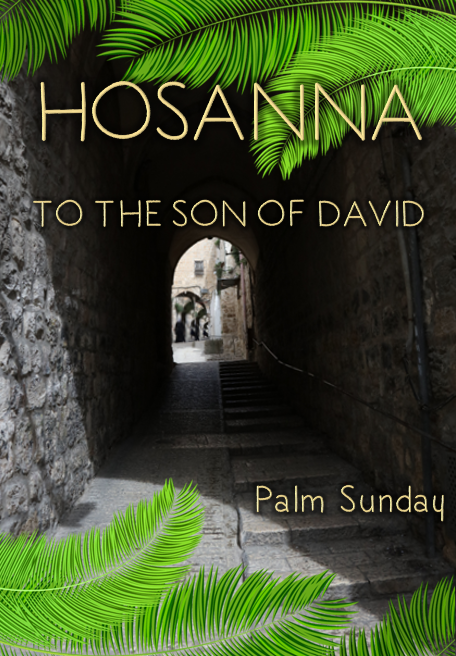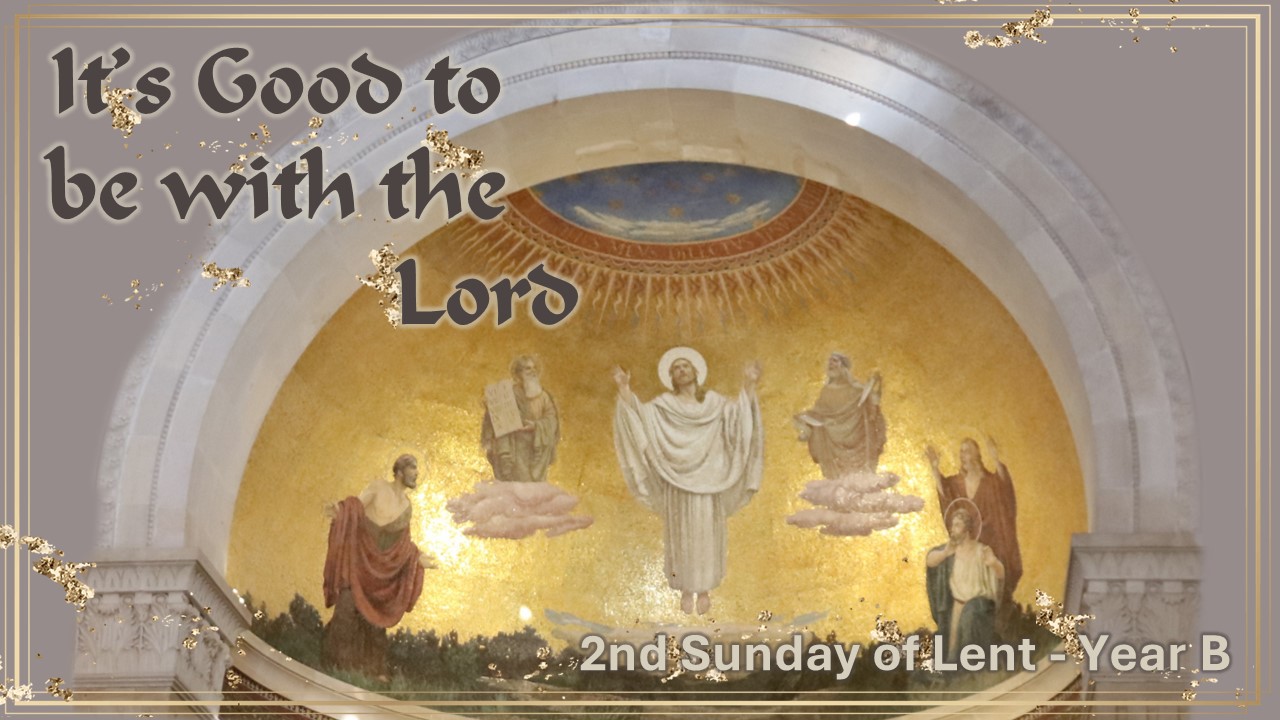
6th Sunday of EASTER – YEAR B ~ MAY 5, 2024
LOVE CHANGES OUR LIFE
This Sunday’s liturgy opens with these words “Proclaim a joyful sound and let it be heard; proclaim to the ends of the earth: The Lord has freed his people, alleluia”. Wow isn’t amazing to hear these words when are facing bad situations. As we continue our journey of Easter Season, last Sunday Jesus invited us to abide in him and bear much fruit which will make us his disciple. There was also a warning “without me you can do nothing” and this must have shaken our pride and understanding that we can do everything without God or Jesus (Please read 2 Corinthians 4:1-15). This Sunday’s Scripture Readings bring us to the knowledge and understanding that God loves us and makes us a winner over the evil.
There is a story about a brave young man who sought Socrates with the desire to become a scholar. He turned to the great Greek philosopher and said, “Oh, illustrious Socrates, I come to you to gain knowledge.” In response, Socrates led the young man through the streets to the seashore, where they sank into the water. Then he asked the young man, “Now tell me, what do you want?” “Knowledge, O wise Socrates,” replied the young man with a smile. Socrates put his hands on the young man’s shoulders and pushed him into the water. Thirty seconds later the philosopher lifted his disciple out of the water. “Tell me one more time, what did you say you wanted?” he asked. “Wisdom, illustrious and wise Socrates,” replied the young man with difficulty breathing.
Socrates pushed him again into the water. Thirty seconds passed, thirty-five, forty, forty-five…. Eventually, Socrates brought him to the surface. Socrates asked him again, “What do you want, young man?” He struggled to answer. “Wisdom, a wise and wonderful …” Socrates immediately threw the young man underwater, this time holding him there for almost a minute. When the young man came to the surface longing for oxygen, Socrates asked him, “What do you want?” “Air!” the young man shouted. “I need air!” “When you long for wisdom as you long for air, then you will have it,” came the unperturbed answer of the wise Socrates.
Isn’t that an amazing story to understand the Scripture Readings today. St. Peter claims “I truly understand that God shows no partiality, but in every nation anyone who fears him and does what is right and acceptable to God”. I believe God doesn’t leave anyone in suffering and in pain but heals them. St. John says in one of his letters that “it is not we who have loved him but is it he who has loved us”. Even in today’s Second Reading he says “Let us love one another, because love is from God; everyone who loves is born of God and knows God. Whoever does not love does not know God, for God is Love”.
The word Love does not only make us feel for ourselves, but it teaches us to learn to sacrifice because if there is no love, there is no sacrifice and there no sacrifice if there is no love. In the Book of Genesis (22) we read the story of Abraham who got a son in his old age but he was ready to sacrifice him “He said ‘Take your son, your only son Isaac, who you love, and go to the land of Moriah, and offer him there as a burnt offering on one of the mountains that I shall show you”. Even God himself to show his unconditional love to humanity, was ready to sacrifice his only Son “God loved the world so much that he gave his only Begotten Son that anyone who believes in him have life and life in abundance”. Someone wrote, “Christians are indistinguishable from other men either by nationality, language, or customs. They do not inhabit separate cities of their own, or speak a strange dialect, or follow some outlandish way of life. Their teaching is not based upon reveries inspired by the curiosity of men. Unlike some other people, they champion no purely human doctrine. Regarding dress, food, and manner of life in general, they follow the customs of whatever city they happen to be living in, whether it is Greek or foreign.
And yet there is something extraordinary about their lives. They live in their own countries as though they were only passing through. They play their full role as citizens, but labor under all the disabilities of aliens. Any country can be their homeland, but for them their homeland, wherever it may be, is a foreign country. Like others, they marry and have children, but they do not expose them. They share their meals, but not their wives. They live in the flesh, but they are not governed by the desires of the flesh. They pass their days upon earth, but they are citizens of heaven. Obedient to the laws, they live on a level that transcends the law.
Christians love all men, but all men persecute them. Condemned because they are not understood, they are put to death, but raised to life again. They live in poverty, but enrich many; they are totally destitute, but possess an abundance of everything. They suffer dishonor, but that is their glory. They are defamed but vindicated. A blessing is their answer to abuse, deference their response to insult. For the good they do they receive the punishment of malefactors, but even then, they rejoice, as though receiving the gift of life. They are attacked by the Jews as aliens, they are persecuted by the Greeks, yet no one can explain the reason for this hatred.
To speak in general terms, we may say that the Christian is to the world what the soul is to the body. As the soul is present in every part of the body, while remaining distinct from it, so Christians are found in all the cities of the world but cannot be identified with the world. As the visible body contains the invisible soul, so Christians are seen living in the world, but their religious life remains unseen. The body hates the soul and wars against it, not because of any injury the soul has done it, but because of the restriction the soul places on its pleasures. Similarly, the world hates the Christians, not because they have done it any wrong, but because they are opposed to its enjoyments. Christians love those who hate them just as the soul loves the body and all its members despite the body’s hatred. It is by the soul, enclosed within the body, that the body is held together, and similarly, it is by the Christians, detained in the world as in a prison, that the world is held together. The soul, though immortal, has a mortal dwelling place; and Christians also live for a time amidst perishable things, while awaiting the freedom from change and decay that will be theirs in heaven. As the soul benefits from the deprivation of food and drink, so Christian’s flourish under persecution. Such is the Christian’s lofty and divinely appointed function, from which he is not permitted to excuse himself”.
St. Augustine reflecting on the mystery of Easter which is the mystery of love wrote this beautiful reflection. Our thoughts in this present life should turn on the praise of God because it is in praising God that we shall rejoice for ever in the life to come; and no one can be ready for the next life unless he trains himself for it now. So, we praise God during our earthly life, and at the same time we make our petitions to him. Our praise is expressed with joy, our petitions with yearning. We have been promised something we do not yet possess, and because the promise was made by one who keeps his word, we trust him and are glad; but insofar as possession is delayed, we can only long and yearn for it. It is good for us to persevere in longing until we receive what was promised, and yearning is over; then praise alone will remain.
Because there are these two periods of time—the one that now is, beset with the trials and troubles of this life, and the other yet to come, a life of everlasting serenity and joy—we are given two liturgical seasons, one before Easter and the other after. The season before Easter signifies the troubles in which we live here and now, while the time after Easter which we are celebrating at present signifies the happiness that will be ours in the future. What we commemorate before Easter is what we experience in this life; what we celebrate after Easter points to something we do not yet possess. This is why we keep the first season with fasting and prayer; but now the fast is over and we devote the present season to praise. Such is the meaning of the Alleluia we sing. Both these periods are represented and demonstrated for us in Christ our head. The Lord’s passion depicts for us our present life of trial—shows how we must suffer and be afflicted and finally die. The Lord’s resurrection and glorification show us the life that will be given to us in the future.
Now therefore, brethren, we urge you to praise God. That is what we are all telling each other when we say Alleluia. You say to your neighbor, “Praise the Lord!” and he says the same to you. We are all urging one another to praise the Lord, and all thereby doing what each of us urges the other to do. But see that your praise comes from your whole being; in other words, see that you praise God not with your lips and voices alone, but with your minds, your lives and all your actions. We are praising God now, assembled as we are here in church; but when we go on our various ways again, it seems as if we cease to praise God. But provided we do not cease to live a good life; we shall always be praising God. You cease to praise God only when you swerve from justice and from what is pleasing to God. If you never turn aside from the good life, your tongue may be silent, but your actions will cry aloud, and God will perceive your intentions; for as our ears hear each other’s voices, so do God’s ears hear our thoughts”.
Holy Father Pope Francis opens our hearts and minds with this amazing reflection on the Gospel “Thinking of his imminent sacrifice on the cross, He adds: “No one has greater love than this, to lay down one’s life for one’s friends. You are my friend if you do what I command you”. These words, said at the Last Supper, summarize Jesus’ full message. They summarize all that He did: Jesus gave His life for His friends. Friends who did not understand Him, in fact they abandoned, betrayed, and denied Him at the crucial moment. This tells us that He loves us, even though we don’t deserve His love. Jesus loves us in this way!”
Thus, Jesus shows us the path to follow Him: the path of love. His commandment is not a simple teaching which is always abstract or foreign to life. Christ’s commandment is new because He realized it first, He gave His flesh and thus the law of love is written upon the heart of man (Jer 31:33). And how is it written? It is written with the fire of the Holy Spirit. With this Spirit that Jesus gives us, we too can take this path!
It is a real path, a path that leads us to come out of ourselves and go towards others. Jesus showed us that the love of God is realized in love for our neighbour. Both go hand-in-hand. The pages of the Gospel are full of this love: adults and children, educated and uneducated, rich and poor, just and sinners all were welcomed into the heart of Christ.
Therefore, this Word of God calls us to love one another, even if we do not always understand each other, and do not always get along… it is then that a Christian love is seen. St. Mother Teresa says, “do small things with great love”. A love which manifests even if there are differences of opinion or character. Love is greater than these differences! This is the love that Jesus taught us. It is a new love because Jesus and his Spirit renewed it. It is a redeeming love, free from selfishness. A love which gives our hearts joy, as Jesus himself said: “These things I have spoken to you, that my joy may be in you, and that your joy may be complete”.
It is precisely Christ’s love that the Holy Spirit pours into our hearts to make everyday wonders in the Church and in the world. There are many small and great actions which obey the Lord’s commandment: “Love one another as I have loved you”. Thanks to the strength of the Word of Christ, each one of us can make ourselves the brother or sister of those whom we encounter. Actions of closeness, actions which manifest the love that Christ taught us.
God wants to cherish his love and presence in our day-to-day life and to remember for us he sacrificed his own Son to make us happy and joyful. The word Love we can break into:
Let go our past and learn to forgive and love one another.
Overcoming the misunderstanding about other
Verify the truth before we take any action or say any word about other.
Everything is going to be fine if we let love work in our lives.
There was an old apple tree in a farmer’s garden. It was so old that it had stopped bearing fruit a long time ago. The only purpose it served was to provide shelter to the sparrows, grasshoppers, and squirrels in the neighbourhood. One day, the farmer decided to cut the tree down. He felt it had become completely useless. Besides, he wanted to get some furniture made and what better way to ensure the wood supply from the tree? The wood was still strong. So, taking a sharp axe in his hand, the farmer struck at the roots of the tree.
At once there was great commotion among the many creatures who inhabited the tree. The grasshoppers, the sparrows and the squirrels came out of their dwelling places and hovered around the farmer. “Please sir,” they begged him. “Spare this tree’s life. It is our only home.” But the farmer only struck harder at the roots. “We promise to sing to you in the afternoons when you toil away. It would lighten your labours so,” entreated the creatures. But their cries were in vain. The farmer continued his task with single-minded concentration. He was in a hurry to finish off the chopping by afternoon. As he raised his axe one more time, something in the hollow of the tree caught his eye. A beehive. Upon looking closer, the farmer found that it was full of honey. He tasted the honey, “oh it tastes heavenly”.
Suddenly the farmer realised that the tree was not so useless after all. Its hollow was the ideal place for a beehive to rest. And if he took away the honey now, the bees would make more. They would certainly not abandon such an attractive residence.
“Hey, you up there,” he announced as he threw away the axe. “I’m sparing the life of this tree. You can live in peace now.”
The sparrows, grasshoppers and squirrels breathed deep sighs of relief. What a blessing that the farmer had found something of use to him in the tree! After all, it was the only reason the tree was still standing.
Do we believe that love can change our life?
Other Sermons In This Series

Palm Sunday – Year C – April 10, 2022
April 08, 2022
PALM SUNDAY YEAR C ~ APRIL 13, 2025
April 10, 2025

2nd Sunday of Lent – Year B ~ February 25, 2024
February 22, 2024

